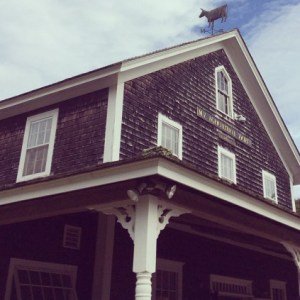How to be a History Detective for your Home
Finding the Hidden History in your Home

This article is fully published at Artisans List - A Business Directory Website
Most people are curious about the history around their homes. It’s why many of us have spent hours watching This Old House and have been fascinated by the distinct story each home has to tell. In addition to the actual structure of your home, learning more about your neighborhood can literally make you feel like you are walking on storied ground. Here in New England, whether you live in the city or country, it’s likely that you are brushing up against great moments in history or retracing the steps of a famous literary figure on a regular basis
Long before I lived in Boston, I was enamored with the city’s South End neighborhood and its brick bowfront townhouses and Victorian brownstones. After settling into the area with my family, I joined the South End Historical Society to find out more about my beloved neighborhood, its storied residents, and fountained squares. Stacen Goldman, the Executive Director of the South End Historical Society shared some of her favorite resources for being your own history detective and tips that will help any curious homeowner find the hidden history in their home.
Kate Hathaway Weeks: Where do you recommend homeowners begin?

Stacen Goldman: The most direct place to start is always with the registry of deeds. The Registry of deeds will generally be located in your county seat. The county should hold deeds for your home and property as far back as the inception of the county. This should include the names of past homeowners, homeowners of previous buildings on your property, and any speculators who owned your property before your home was built. In some cases, it might even include the name of the builder or developer who built your home. Whether this information will be available online will vary from county to county, but thanks to the fact that its your home county, you shouldn’t have to travel too far to get the information.
KHW: What is a favorite resource of yours that would surprise most people?

SG: Historical Maps. What’s so great about old maps is that they’re just as fun to look at as they are informative! Though you have to track the right map down, once you’ve found it, there’s often a lot of detail included that you wouldn’t expect. Addresses, historic lot sizes, and Home- and Landowners are often included on historic maps. If you live in a city, there might be detailed ward maps available for your research. To find maps, you might want to start with your local library or historical society. If your town or city has its own archives, that is a great place to look for ward or assessor’s maps that include your property. Historic New England has extensive collections, including maps, relating to the history of the region. Norman B. Leventhal Map Center at the Boston Public Library is one of the most extensive and comprehensive collections of maps in the country. The Leventhal Map Center also has a large number of their collections digitized online. To find more digitized historic maps, you can also check WardMaps, LLC a great resource for finding digitized historic maps. WardMaps provides digitized images of their maps for free online and sells original antiques and reproductions.
KHW: What if you are hitting walls early on in the process?

SG: If all else fails, there’s always the Census. America’s first census was taken in 1790 a little over a year into George Washington’s first term as President. It has been taken every ten years since then, so National census records are as complete as they get. However, getting information about your house from census records can be a little tricky — the census is much easier to search by name than it is to search by address. Additionally, census records are not all digitized in one central place by the Federal government. If you want the definitive, comprehensive census records from the Federal Government, you’ll have to travel in person to the National Archives. Luckily, this doesn’t necessarily mean a trip to D.C., since New England does have its own regional branch of the archives in Waltham, MA. Many census records have been digitized by private businesses and non-profit organizations such as New England Genealogical Historical Society, ancestry.com and Heritage Quest Online. These sites can’t be searched by address, however all of their searches do allow you to search by census year and location. You’ll have to weed through the records once you reach the town level. Some cities and states also collect census data of their own, so don’t forget to try your city or state libraries and archives. If you know your city conducts a census, that might be the best place to start, since it’s easier to weed through records on the local level..
KHW: Once you’ve obtained the name of a past homeowner, speculator, or builder, you might want to do some more extensive research. What are some recommended approaches for anyone who wants to know more than just a name?

SG:* Genealogical Research. Thanks to the popularity of genealogy, researching your home’s historic inhabitants is fairly easy. The above mentioned New England Historic Genealogical society New England Genealogical Historical Society, ancestry.com and Heritage Quest Online, all use past census data and other historical documents to give you information about the people who lived in or built your historic home. From a genealogical search, you can usually determine a person’s occupation, the size of his or her household, his or her place of birth, his or her ethnic background, and the value of his or her estate. Additionally, you can perform some genealogical research on these previous homeowners and find if they have any notable ancestry or descendants of their own!
KHW: Do you have any tips for history buffs and curious homeowners that may live in a smaller town and are looking to learn more about their local history?
SG: Especially if you come from a small town, finding some general resources for local history can illuminate a lot of information about your home. The early history of small New England towns is often very insular, with only a few initial settlers inhabiting the town and working the land. If you have an old Colonial or an early Federal home, there’s a good chance you can find its first inhabitants among the earliest settlers of your town. Be sure to contact your local historical society, library, and amateur historians to help you get your research off the ground!